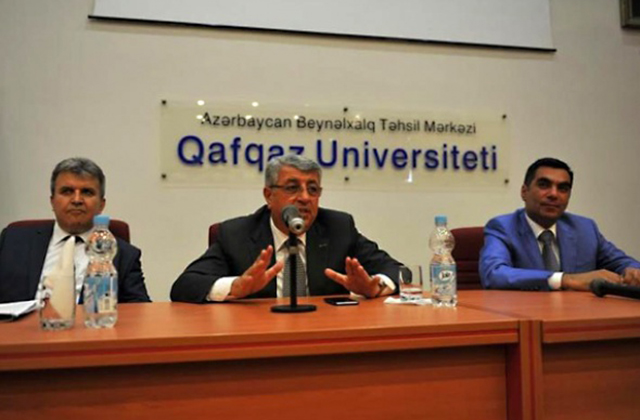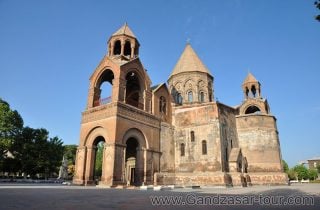Caucasus Faces Fallout from Turkey’s Failed Coup

Experts weigh wide-ranging geopolitical and security repercussions.
The failed military coup attempt in Turkey on July 15 has caused great concern in the neighbouring South Caucasus region.
Armenia, Azerbaijan and Georgia are closely watching developments in Turkey, which has seen mass arrests, the declaration of a state of emergency and a slide towards authoritarianism.
Turkey´s government has accused Fethullah Gülen, an Islamic cleric residing in the United States, of masterminding of the coup and demanded his extradition. Gülen and his supporters have also been active in the South Caucasus, particularly in Azerbaijan.
Meanwhile, as relations between Turkey and the United States soured over the last two weeks, Ankara has worked on renewing its friendship with Moscow.
Turkish President Recep Tayyip Erdogan is to meet his Russian counterpart Vladimir Putin on August 9 in St Petersburg – the first meeting between the two leaders since Turkey shot down a Russian Su-24 fighter jet over Syria last year.
This may have geopolitical and security repercussions for the three countries in the region, especially in western-leaning Georgia.
Kakha Gogolashvili, director of EU Studies at the Georgian Foundation for Strategic and International Studies (GFSIS), said that these developments could harm democracy in the South Caucasus, weaken NATO´s presence in the Black Sea region and thereby impair Georgia´s security.
“Decreasing the level of cooperation between Turkey and West and the possible establishment of relations with Russia will harm the whole region,” Gogolashvili told IWPR.
Azerbaijan and Georgia have close ties to Turkey and its leaders were among the first to express their support for Erdogan, as the elected head-of-state, over the coup plotters.

Azerbaijan´s president Ilham Aliyev strongly condemned the coup attempt and welcomed Erdogan’s actions to stabilise the situation in Turkey, according to presidential aide Ali Hasanov.
“Azerbaijan´s President Ilham Aliyev followed the events happening in Turkey all night long with anxiety and was deeply concerned about the ongoing processes,” Hasanov told the Trend news agency on July 16.
Aliyev, the region’s most authoritarian leader, spoke to Erdogan over the phone on July 18. Georgia´s Prime Minister Giorgi Kvirikashvili met the Turkish president in Ankara two days later.
“ONE NATION, TWO STATES”
Turkey has the closest relationship with Azerbaijan amongst all the countries of the South Caucasus. Ankara was the first to recognise Azerbaijani independence in 1991 and has been a staunch supporter of its territorial integrity in the conflict over Nagorny Karabakh.
Both are Turkic countries with shared cultural and linguistic ties on which they have built a strong political, economic and military partnership. Their relations are often described as “one nation, two states”.
In addition, all major energy projects involving Azerbaijan pass through the territory of Turkey. As a result, Turkey has considerable influence over Azerbaijan.
The Gülen movement, which runs over 2,000 educational institutions worldwide, also developed a notable presence in Azerbaijan from the early days of independence. But in 2014, at Erdogan’s urging, all its schools were closed and the Gülen-affiliated Caucasus University in Baku was transferred to the State Oil Company of the Azerbaijani Republic (SOCAR).
(See Azerbaijan Closes Gülen Schools and Senior Azeri Official Sacked in Spillover From Turkish Internal Strife).
On July 18, Azerbaijan´s National Council for Television and Radio ordered the independent television station ANS TV, which had planned to screen an interview with Gülen, to stop broadcasting for one month. The official reason given was “to prevent provocation” and “to not allow the open propaganda of terrorism”.
This was also the day Erdogan and Aliyev spoke by phone.
On the following day, on July 19, ANS vice president Mirshahin Agaev called a press conference to apologise to the Turkish and Azerbaijani people and ask Aliyev not to close down the channel.
Then, on July 20, Azerbaijan´s education ministry announced that the Caucasus University had been shut down.
Azer Ismail, advisor to the chairman of the opposition Musavat party, expressed dismay at the sequence of events.
“The process has just started and Azerbaijan has already closed the station and the university, by the way, the best university in the country. I am even afraid to think of what might happen next,” he said.
A BRIDGE BETWEEN EAST AND WEST?
Like Azerbaijan, Georgia has long-standing political, economic and military relationships with Turkey.
Georgia is a transit country for two pipelines running from Azerbaijan to Turkey – the Baku-Tbilisi-Ceyhan oil pipeline and the South Caucasus gas pipeline, also called the Baku-Tbilisi-Erzurum pipeline.
It is also involved in the ongoing construction of the Baku-Tbilisi-Kars railway, a regional rail link connecting Turkey, Georgia and Azerbaijan.
Moreover, there are also educational institutions linked to Gülen in Georgia.
Turkey´s consul general in Batumi, Yasin Temizkan, released a statement on July 18 calling on Georgian parents not to send their children to these schools.
Later that day, the Turkish ambassador to Georgia Levent Gümrükçü claimed that Temizkan´s statement had been misinterpreted, although Georgian TV stations then published a video of the consul´s full statement.
One of Tbilisi´s main concerns in the aftermath of the coup is the future of relations between Turkey and Russia on the one hand and Turkey´s relations to Western partners on the other.
“For Turkic-speaking countries, Turkey has been an example of a successful secular state and a bridge between East and West,” said the GFSIS’s Gogolashvili. “If the bridge collapses, it has an adverse impact not only on the Caucasus, but also on the Caspian region and Central Asia. This can lead to the increasing isolation of the region.
“Most international projects here have passed through Turkey and it has been an important factor of their safety,” he continued. “If trust in Turkey declines, it may result in a decline of trust in the entire region.”
On July 15, the day of the coup attempt in Turkey, Russian defence minister Sergey Shoygu caused concern when he said that Syria-like crises could be triggered in any country, including the post-Soviet republics of Central Asia and the Caucasus.
“In these circumstances, Russia will be forced to adequately respond to potential threats,” Shoygu said, according to the state news agency Russia Today
Soso Tsiskarishvili, president of the Club of Independent Experts in Tbilisi, said his comments highlighted the importance of the upcoming meeting between the Turkish and Russian presidents.
“As we have seen harsh rhetoric against the United States, we can suppose that the Russian president is boundlessly happy,” he said.
“Shoygu’s statement that Russia views the South Caucasus as a potential Syria presents a direct threat. Neither Shoygu, nor [Russian foreign minister Sergei ] Lavrov make such statements, if there is no text from the president administration on the table,” Tsiskarishvili told IWPR.
HOSTILE RELATIONS
The relationship between Armenia and Turkey has been complicated due to the dispute over the recognition of the Ottoman-era Armenian genocide as well as Armenia´s refusal to ratify the Treaty of Kars and Turkey´s support for Azerbaijan in the Karabakh conflict.
The two countries have no diplomatic relations and their joint border has been closed since 1993 on Turkey´s initiative.
Officials in Yerevan have refrained from commenting on the recent developments in Turkey.
But July 16 saw the border service of the Federal Security Service of the Russian Federation, which guards Armenia´s border with Turkey and Iran, stepping up security along the 300 kilometre Armenian-Turkish section.
There are about 4,500 Russian border troops in Armenia, with costs shared equally between Russia and Armenia.
According to Ara Papian, a political analyst and president of the Centre Modus Vivendi in Yerevan, Armenia has failed to respond adequately to the developments in Turkey.
“In the early days there was no reaction, and after July 17, due to internal problems in Armenia [following the armed seizure of a police station in Yerevan that led to a two-week standoff], this question was sidelined,” he told IWPR.
But Papian said the events in Turkey were important for Armenia, and may have both a positive and negative impact.
“I call it positive that Azerbaijan without the backing from Turkey has become more modest in its actions on the front line. Although it seemed that Azerbaijan could benefit from the ongoing situation in Yerevan,” he said.
“Negative for us is the Turkish-Russian rapprochement. All these recent apologies of Erdogan to Putin have not been made at random. When the Turks and Russians find a common language, it is not for the benefit of the Armenians,” Papian concluded.
One way to counter possible security threats to the South Caucasus would be to boost cooperation between the three countries, according to Tsiskarishvili of the Club of Independent Experts.
“Georgia should strengthen its role to maintain the peace in the region. The Karabakh issue should also recede into the background, however complicated it may be, as we stand to lose much more,” he said.
“Shoygu’s words indicate that Russia could contribute to the escalation of tension, and then, under the guise of peacekeepers, enter its ´ministry of attack´ in the region,” he said, referring to Russia´s ministry of defence.
However, most observers agree that the idea of closer trilateral cooperation between Azerbaijan, Armenia and Georgia is unrealistic. It would be unpopular within the countries themselves and fail to benefit Russia, with which Azerbaijan and especially Armenia maintain a strategic partnership.
Samira Ahmedbeyli is IWPR´s editor for Azerbaijan, Suren Deheryan is IWPR’s editor for Armenia and Giorgi Kupatadze is IWPR´s editor for Georgia.

























